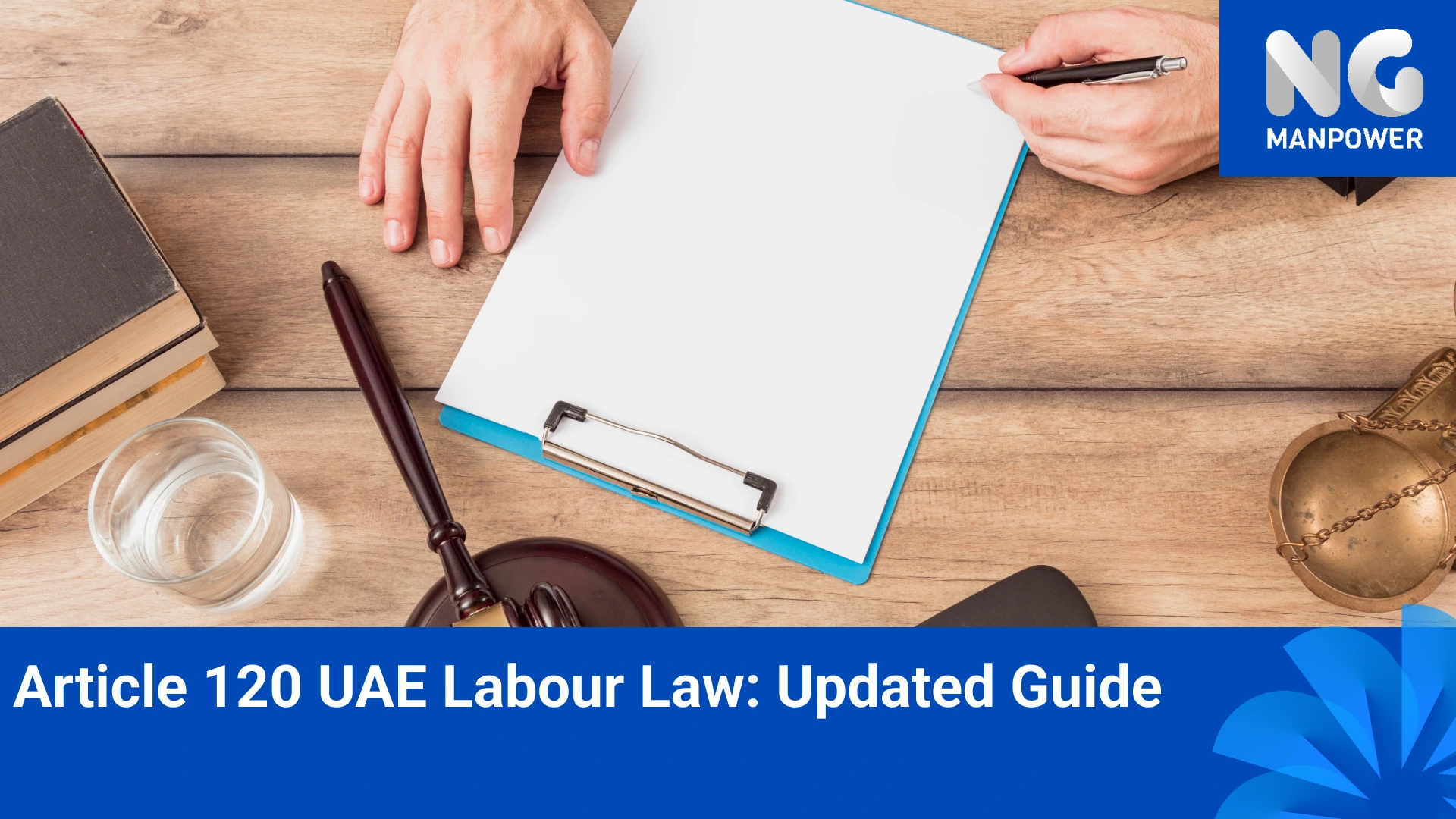Understanding the intricacies of employment in the UAE requires a deep dive into the core framework of employment laws in UAE. This guide serves as an indispensable resource for both employers and employees, unraveling the complexities inherent in the employment landscape. This is the key to the Emiratisation Dubai.
In this article, we explore the various dimensions of UAE labor regulations, shedding light on crucial aspects that shape the employment scenario in the region.
Termination Tactics: Complying with Emiratisation rules
Terminating an employment contract in the UAE demands a strategic approach that aligns with the intricate web of employment laws Dubai, collectively shaping the landscape of labor regulations UAE. Navigating this terrain requires a meticulous understanding of the guidelines set forth by the Department of Employment and Labor and the nuances of wages and salary regulations.
In complying with employment laws in Dubai, employers must be aware of the stipulated notice periods. Failure to adhere to these periods may result in legal ramifications. However, the complexity of termination extends beyond notice periods. Employers must also consider gratuity calculations, which are integral components of wages and salary regulations. This ensures that employees are rightfully compensated for their service tenure.
Additionally, termination proceedings must align with the overarching principles of fairness outlined in labor regulations UAE. Employers should maintain comprehensive records of the termination process, including any misconduct or performance issues that led to the decision. This documentation serves as a safeguard in the event of legal scrutiny.
The different employees
Also, employers must ensure that the termination process is respectful and considerate of the affected employee. This is essential for the employment laws in UAE. This approach not only aligns with Department of Employment and Labor guidelines but also fosters a more positive organizational culture.
Moreover, as part of termination tactics, employers should be well-versed in the specific Emiratisation requirements UAE for different categories of employees. For instance, termination procedures for UAE nationals may differ from those for expatriates. This highlights the importance of understanding the diverse implications of Emiratisation law UAE based on the employee’s nationality and status.
Employee Rights Post-Termination
In the realm of UAE employment, understanding the intricate tapestry of employment laws Dubai is equally crucial for both employers and employees, particularly when it comes to delineating employee rights post-termination. This phase involves a careful orchestration of compliance with the Department of Employment and Labor, ensuring that wages and salary regulations are adhered to even after the termination event.
After termination, employees are entitled to certain rights, which are enshrined in the robust framework of labor regulations UAE. To clarify, the termination process does not strip employees of their basic rights. Instead, it marks a transition where these rights are redirected, often in the form of end-of-service benefits, also known as gratuity. This is essential for the employment laws in UAE.
However, the calculation and disbursement of gratuity must strictly adhere to the stipulations within employment laws in Dubai. This includes considering the employee’s tenure, the reason for termination, and the specifics outlined in wages and salary regulations. This financial remuneration is a fundamental aspect of employee rights post-termination. Also, it is designed to provide a financial cushion during the transition period.
Furthermore, employees possess the right to challenge their termination if they believe it to be unjust. This underscores the importance of employers meticulously following the termination protocols set by the Department of Employment and Labor. If terminations deviate from these guidelines, employees can seek legal recourse to protect their rights.
In other words, employee rights post-termination are not just legal formalities but integral components of maintaining a fair and equitable work environment. Employers must ensure that terminated employees are provided with all due entitlements.
Dismissal Due to Misconduct
Navigating the intricate landscape of employment in the UAE requires a comprehensive understanding of the employment laws in UAE, particularly when it comes to the delicate matter of dismissal due to misconduct. Employers must tread carefully, ensuring that such actions align with the legal framework established by the authorities.
In this context, it is essential to recognize that dismissal due to misconduct is a serious and consequential step. Employers, according to employment laws in UAE, must establish a clear and documented case of misconduct before initiating any dismissal proceedings. This involves conducting a thorough investigation, gathering evidence, and adhering to due process.
However, the definition of misconduct can vary, making it imperative for organizations to explicitly outline and communicate acceptable behavior through employee handbooks or codes of conduct. As a result, employees are informed about the standards expected of them, establishing a foundation for fair and justifiable dismissals.
Rights and Responsibilities: The UAE Employee Handbook
Firstly, the Department of Employment and Labor underscores the significance of a well-defined Employee Handbook. It acts as a guide, providing employees with insights into the company’s policies, procedures, and their rights under the prevailing employment laws in UAE.
An intelligently crafted handbook is not merely a formality; rather, it serves as a strategic tool to mitigate legal risks. Moreover, the Employee Handbook can be periodically updated to align with evolving employment laws Dubai.
To clarify, the handbook should comprehensively cover both the rights and responsibilities of employees. It delineates the expectations regarding work hours, code of conduct, performance standards, and compliance with 2 emiratisation law UAE. This is essential for the employment laws in UAE.
The handbook serves as a reference point for employees to understand their rights in various scenarios. For example, termination, leave entitlements, and compliance with wages and salary regulations. As a result, employers can maintain transparency, fostering a positive work environment and reducing the likelihood of disputes.
Furthermore, outlining disciplinary procedures in the handbook ensures that employees are aware of the consequences of misconduct. Consequently, this not only upholds the principles of fairness and justice as mandated by labor regulations UAE. However, it helps in swift resolution of conflicts.
Balancing Employee and Employer Needs
Balancing the needs of employees and employers is a delicate art, requiring a nuanced approach to foster a harmonious work environment. The intricacies of this delicate equilibrium are paramount in the realm of employment laws in UAE. So, this is very relevant for the Emiratisation law. Furthermore, cultivating a culture of open communication contributes significantly to this equilibrium. Employers should be transparent about their expectations, policies, and organizational goals.
To strike an effective balance, companies should consider employee welfare programs and initiatives. In other words, going beyond basic legal requirements and investing in employee well-being can enhance job satisfaction. This aligns with the broader vision of the UAE, emphasizing the significance of employee happiness for the emiratisation law in UAE.
Embracing diversity and inclusion is integral to this equilibrium. Therefore, companies should implement inclusive policies that consider the diverse backgrounds, cultures, and expectations of their workforce. This approach aligns with the UAE’s commitment to creating a work environment that respects individual differences.
Work Hours and Breaks for employees
To begin with, UAE labor laws stipulate a standard 48-hour workweek. Consequently, employers must structure their work hours within this legal framework. It is imperative to note that adhering to these regulations is not just a legal obligation but also contributes to creating a positive work culture.
Ensuring that employees are aware of their rights concerning work hours is vital. Moreover, organizations should provide clarity on overtime policies, ensuring that any additional work hours are compensated according to the Department of Employment and Labor guidelines. This is essential for the 2 emiratisation law.
The provision of breaks is another crucial aspect regulated by employment laws in UAE. Employees are entitled to breaks during the workday, and the duration of these breaks is specified by law. Employers must factor in these breaks to promote employee well-being and job satisfaction.
Additionally, the nature of certain industries may require flexible work hours. In such cases, it is essential to have clear policies and agreements in place, keeping in mind the legal parameters set by labor regulations UAE. This approach fosters flexibility without compromising on compliance.
The HR department plays a pivotal role in ensuring that work hours and break policies are effectively communicated to employees. Furthermore, regular training and updates on any changes in these policies contribute to a well-informed workforce. So, do you know the Dubai emiratisation?
In conclusion, adherence to work hours and breaks is essential to maintain a healthy work-life balance and comply with employment laws in UAE. For expert guidance on navigating UAE labor regulations, consult with NG Manpower. Contact us!
FAQs
What are the key UAE labour regulations every employee should know?
The UAE labour regulations that every employee should know include contracts, wages, working hours, leave, and termination rights.
What are the major changes in the new UAE labour law?
The major changes in the new updates focus on flexible work models, employee rights, and contract clarity.
How do UAE labor regulations define working hours and overtime?
As per UAE’s labour regulations, standard working hours apply and the overtime is supposed to be paid.
What are the rules for employment contracts under UAE Labor Law?
Under the labour laws of UAE, the employment contracts must be written and time bound in clearly defined terms.
How does UAE Labour Law handle end-of-service benefits and gratuity?
Employees are entitled to gratuity based on service length and salary.
How do UAE Labour Laws ensure workplace equality and safety?
UAE Labour Laws ensure workplace equality and safety by promoting non-discrimination, fair treatment, and safe working conditions.






